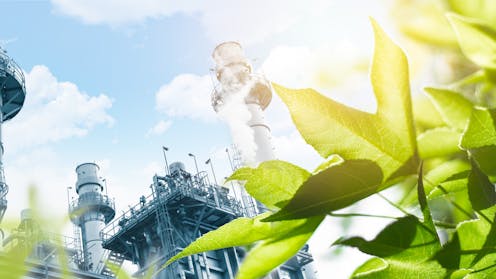
- Select a language for the TTS:
- UK English Female
- UK English Male
- US English Female
- US English Male
- Australian Female
- Australian Male
- Language selected: (auto detect) - EN
Play all audios:
May 8, 2025 Atmospheric CO₂ concentrations are surging, even as emissions level out. Natural carbon sinks are showing signs of faltering as we continue to emit CO₂. December 6, 2024 Andrew
Lenton, _CSIRO_ and Kerryn Brent, _CSIRO_ Efforts to reduce emissions and decarbonise industry must be combined with new technology that removes carbon dioxide from the atmosphere. Australia
can build an industry around this service. November 13, 2024 Ol Perkins, _King's College London_; Alexandra Deprez, _Sciences Po _, and Kate Dooley, _The University of Melbourne_
Removing enough carbon to offset emissions would require vast tracts of inhabited land. August 5, 2024 Natascha Kljun, _Lund University_ and Julia Kelly, _Lund University_ Carbon lost during
the 2018 fire season in Sweden could take 40 years to return to trees and soil. April 3, 2024 Yolandi Ernst, _University of the Witwatersrand_ and Sally Archibald, _University of the
Witwatersrand_ Knowing which parts of Africa best help to store carbon means funding and policy efforts can be directed to protecting and increasing this carbon ‘land sink’. March 20, 2024
Tim Wardlaw, _University of Tasmania_ Our tallest trees are world champions when it comes to capturing and storing carbon, but they don’t like the heat. Climate change will trigger mass tree
deaths in Tasmania. Here’s what can be done. January 31, 2024 Jacqueline L Raw, _Nelson Mandela University_ Wetlands can prevent flooding, trap carbon and support livelihoods, as long as
they are protected and managed. January 22, 2024 Dominick Spracklen, _University of Leeds_ Nearly a third of all moorland burning in Scotland occurs on peat soil – a vital carbon sink.
December 20, 2023 Nicolas Barbier, _Institut de recherche pour le développement (IRD)_; Bonaventure Sonké, _Université de Yaounde 1_; Le Bienfaiteur Sagang, _University of California, Los
Angeles_; Pierre Ploton, _Institut de recherche pour le développement (IRD)_, and Stéphane Momo Takoudjou, _Université de Liège_ Depending on the methods used, the measurement of forest
carbon can vary by as much as 100%. November 17, 2023 Jürgen Knauer, _Western Sydney University_ Climate modelling that best accounts for the processes that sustain plant life predicts
plants could absorb up to 20% more CO₂ than the simplest version predicted. September 28, 2023 H. Damon Matthews, _Concordia University_; Alexander Koch, _University of Hong Kong_; Amy
Luers, _Concordia University_, and Kirsten Zickfeld, _Simon Fraser University_ Tracking both the amount of carbon and the time that it remains stored is key to unlocking the potential of
nature-based carbon storage as a climate mitigation strategy. April 20, 2023 Sophie Wilkinson, _Simon Fraser University_ and Mike Waddington, _McMaster University_ New research shows that
northern peatlands may not help regulate our climate by the end of the century. March 16, 2023 Benjamin Gearey, _University College Cork_; Maureen O'Connor, _University College Cork_,
and Rosie Everett, _University College Cork_ Peatlands have always had a place in art, writing and poetry. In times of global warming these cultural reflections can help open up debate about
the biodiversity and climate crisis. March 6, 2023 Harry Smith, _University of East Anglia_; Johanna Forster, _University of East Anglia_, and Naomi Vaughan, _University of East Anglia_
National strategies depend on natural methods to offset emissions – but acknowledge this may not be possible. January 17, 2023 Mauro Lourenco, _University of the Witwatersrand_ The Angolan
Highlands are hydrologically and ecologically important - and the region’s newly mapped peatlands are valuable “carbon sinks”. January 10, 2023 Jacqueline L Raw, _Nelson Mandela University_
and Hlengiwe Mbatha By adapting and applying existing policies, South Africa can protect and restore its critical ‘blue carbon’ sinks. July 21, 2022 Bart Crezee, _University of Leeds_ and
Simon Lewis, _UCL_ Peat is partially decomposed plant matter that has accumulated over thousands of years. January 31, 2022 Paul W Thomas, _University of Stirling_ Inoculating trees with an
edible fungi can produce more protein per hectare than pasture-raised beef, while reforesting, storing carbon and restoring biodiversity. December 15, 2021 Meike Siegner, _Toronto
Metropolitan University_ and Cory Searcy, _Toronto Metropolitan University_ As more companies feature wood and other bio-based products in their offices, what are opportunities and
limitations of making corporate net-zero carbon pledges about building materials? December 8, 2021 Tom Fairman, _The University of Melbourne_; Craig Nitschke, _The University of Melbourne_,
and Lauren Bennett Climate change threatens the crucial storage of carbon in Aussie forests. Victoria’s national parks alone store almost 1 billion tonnes of carbon dioxide equivalent.








